|
|
|
Sort Order |
|
|
|
Items / Page
|
|
|
|
|
|
|
| Srl | Item |
| 1 |
ID:
115818
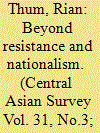

|
|
|
|
|
| Publication |
2012.
|
| Summary/Abstract |
Kashgar's seventeenth-century ruler-saint, Afaq Khoja, is remarkable for the amount of historical writing he has inspired, both outside and within Chinese Turkestan. His reputation among Uyghur historians is one of the few aspects of local Uyghur historical knowledge production that has attracted the attention of foreign scholars. In this essay the author uses the now-familiar example of Afaq Khoja's reputation to show that much of what is distinctive about local Uyghur approaches to history has been so little understood as to be missed even in this often-discussed case. This article describes how the local historical appropriation of Afaq's reputation, particularly the recording of narratives about Afaq in writing, began as a typical product of the Naqshbandi maqamat tradition, was reshaped into Kashgarian local history in the nineteenth and early twentieth centuries, and then reshaped again as an ethno-national history beginning in the 1930s, culminating in the publication of the popular historical novel, Apaq Khoja, and its subsequent burning by officials of the People's Republic of China. While the reputation of Afaq in the present certainly reflects the current political context, it also bears significant marks of these earlier traditions through which it has passed. Thus this article argues for an understanding of 'local history' as a form of knowledge production that embraces a host of historical approaches, including transnational devotional literature, popular local oasis history and nationalist historical fiction. The author also suggests that these transformations of local history have reflected shifting senses of what is 'local' over the last 300 years. The argument is advanced through philological investigation of the manuscript sources, ethnographic fieldwork and literary analysis of the recent novel Apaq Khoja.
|
|
|
|
|
|
|
|
|
|
|
|
|
|
|
|
| 2 |
ID:
079635
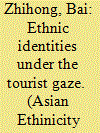

|
|
|
|
|
| Publication |
2007.
|
| Summary/Abstract |
This paper examines the construction of Bai ethnicity and Bai identity on the tourist market in Dali, Dali Bai Autonomous Prefecture, Yunnan, China. Focusing on how the social landscape of Dali has changed in response to the development of tourism, this paper explores how Bai ethnicity is advocated as a product loaded with potential economic values. The author discovers that 'commerce of authenticity' (T. Oakes, Tourism and modernity in China. London, Routledge, 1998), and different forms of ethnicity and artefacts promoted in the tourist market have not drowned out the sense of being ethnically Bai. Instead, the tourist industry has become a daily reminder of ethnicity to both insiders and outsiders by making people more self-conscious and reflexive about the 'cultural stuff' that they may have previously taken for granted, or may have left unattended. This paper demonstrates how locals actively appropriate state-defined categories and reshape them into the repertoire they desire
|
|
|
|
|
|
|
|
|
|
|
|
|
|
|
|
| 3 |
ID:
177587
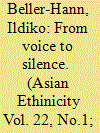

|
|
|
|
|
| Summary/Abstract |
Based on a close reading of three narratives, the article explores subtle shifts in the textual strategies employed by Uyghur intellectuals in Xinjiang in conveying identity discourses in different phases of the reform era. Although it is tempting to view these texts in terms of resistance, they are better approached as sites of accommodation, motivated by the wish to bolster a sense of Uyghur belonging without jeopardizing individual and communal self-preservation. Increasing political pressure on indigenous knowledge production culminated in 2016 in brutal silencing. Shifting textual strategies in the preceding decades demonstrate how native narratives creatively shaped and redefined representations of the ‘Uyghur’ as an ethnic group in constant dialogical negotiation with the changing socio-political context; the texts can thus be read as sensitive barometers of policy changes.
|
|
|
|
|
|
|
|
|
|
|
|
|
|
|
|
| 4 |
ID:
115815
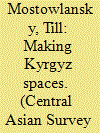

|
|
|
|
|
| Publication |
2012.
|
| Summary/Abstract |
In the past decade local scholars in Murghab, Tajikistan's easternmost district, have published several books in Kyrgyz on the history and culture of the Eastern Pamirs. In their work, the authors address the region's predominantly Kyrgyz population by emphasizing the 'kyrgyzness' of the Eastern Pamirs, which they refer to as Sarykol. The results of these local studies reverberate widely on the ground and have become integrated into everyday interaction. As a consequence, not only the region's history and culture, but also its territory, are perceived through an increasingly ethnicized lens. This paper seeks to explore local history as a way of appropriating space. Following Henri Lefebvre (1974), local history can be defined as an ethno-spatial practice that emphasizes ethnicity. Through an analysis of five works on local history and culture and their embedding in an ethnographic context, this article provides evidence for the significance of local studies in 'kyrgyzizing' space. It also demonstrates, moreover, that international non-governmental organizations, through their funding of such research, are entangled with globalized visions of culture, tradition and ethnicity.
|
|
|
|
|
|
|
|
|
|
|
|
|
|
|
|
| 5 |
ID:
142848
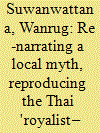

|
|
|
|
|
| Summary/Abstract |
This analysis of 'The Myth of Sao Hai', a short story by the contemporary Thai author Daen-arun Saengthong, focuses on the transformative act of translating an oral provincial myth into written literary form. 'The Myth of Sao Hai' depicts the sacrifice for the 'nation' of a female spirit inhabiting a millennial tree in a remote part of the jungle. The contention in this paper is that the myth, as re-narrated by Daen-arun, reveals the problematic conditions under which peripheral voices are constantly relegated to a subaltern position in relation to the centre. These are the same conditions under which Thailand's local history has been written: that is to say, under and through a hegemonic 'royalist–nationalist' history. However, through an analysis of 'ironic fissure' – that is, of dissident voices which disrupt the narrative homogeneity – the paper argues that the relationship between the national and the local is not mirrored in a fixed binary opposition of oppression and subordination. Rather, the relationship is marked by ambivalence, an ambivalence that is crucial to the possibility of the writing and the 'narration' of both.
|
|
|
|
|
|
|
|
|
|
|
|
|
|
|
|
| 6 |
ID:
175143
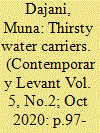

|
|
|
|
|
| Summary/Abstract |
This paper provides an overview of settler-colonial imaginaries of water and how they have cast the area of Sahl al-Battuf as the imagined site of a reservoir and a critical junction for the realisation of the Israeli National Water Carrier. Focusing on the events surrounding the construction of this project, I show how Palestinians inside Israel, at that time living under Israeli military rule, engaged with the state to protest and negotiate their claims over land and water. The findings reveal how settler-colonial imaginaries produce uneven waterscapes and have an enduring impact on Palestinian environmental imaginaries. Narrating and analysing water histories from below allows for a better exploration of indigenous opposition and reclamation of their water use and management. Palestinian struggles for water and land reveal how such mobilisation was shaped by the state’s relationship with its estranged Palestinian populations in the midst of citizenship claims, and therefore show how such resource struggles were being constituted through water as a vessel for making claims of recognition.
|
|
|
|
|
|
|
|
|
|
|
|
|
|
|
|
| 7 |
ID:
115820
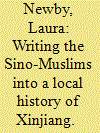

|
|
|
|
|
| Publication |
2012.
|
| Summary/Abstract |
The objective of this article is to look beneath the regional history of Xinjiang itself and examine the way in which, from the late Qing to the contemporary era, the state has recorded (and arguably failed to record) the local history of Sino-Muslim communities in Xinjiang. It will focus on the shifting relationship that the state has had with both the Sino-Muslims and the region itself, but also the political trends that have so constrained the telling of a local history that encompasses their experiences. At issue here is not whether the Sino-Muslims should be regarded as a distinct nationality or ethnic group, nor their claim to be 'local' (bendi ren), but rather the way in which this particular community, or indeed communities, have been reflected and recorded in the state's evolving narrative of the history of modern Xinjiang.
|
|
|
|
|
|
|
|
|
|
|
|
|
|
|
|
|
|
|
|
|